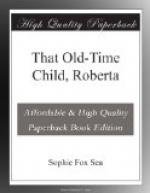“I never mean to marry anybody,” said Roberta, getting down from Mam’ Sarah’s lap, and shaking out the creases in her muslin dress. She was a dainty creature. “I am going to be an old maid and take care of mamma. May be I can make her laugh and sing, after a while, like Aunt Betsy says she used to. I’ll never leave her, never, never. And then there’s Aunt Betsy to take care of, and you, and Aunt Judy and all.”
“Bless your sweet mouf. But we’ve gotter die fo’ long, honey, en be put erway in the cold groun’ fur the wurms ter make meals of; sum of us cheaten’ the grave rite now. What iz you gwiner do then, honey?”
“Then,” said the child, and her face was sober indeed, “when that comes to pass I shall be very, very sorry for a long time; but I will try to make others happy, as mamma does, and may be that will comfort me a little. I will get all the little girls together, like me, that haven’t got any papas and mammas, and all the little hunchback darkies like Dilsy, and all the sorrowful people like mamma, and I’ll love ’em and take care of ’em until the angel comes for us, the angel that God sends.”
Thus the years rolled by until the war came. Peaceful, happy years they were to Roberta on the old farm; golden years, in which the child’s character grew and strengthened, with no unkindly influence to warp it, and her nature, it seemed, became more responsive all the time to the love that was lavished upon her.
Mam’ Sarah told Roberta that she was going down to the tobacco fields, early Sad-day morning, July 4, ’63, and Roberta coaxed her mamma to let she and Polly and Dilsy go with her. Although Federal cannon were planted along the bluff overlooking Green River, their presence occasioned no especial uneasiness, nor suspicion of impending warfare. Mrs. Marsden as well as everybody else had grown accustomed to them. Almost during the entire civil war that point was thought important on account of the bridge; army stores were constantly shipped South that way.
So the three children started off, merry as larks, with their trusty companion.
On either side of the turnpike road were green fields flushed with light. The morning air stirred about them, redolent in sweet scents and attuned with the many voices of summer. They heard the drowsy hum of bees; and butterflies were there, thick as motes in the midday sun. Roberta’s observant, nature-loving eyes roved delightedly from one point to another of the sunny landscape, while she repeated gaily to Mam’ Sarah a little couplet. The child’s memory was stored with quaint rhymes:
“A country lane between
fields of clover
Rippling in sunshine over
and over.
There the whirl of gay revelrie,
Butterflies waltzing mad with
glee,
Honey-bees, powdered in dust
of gold,
Chassezing around like gay
knights of old,
Clad in silken doublet and
hose;
Lookout, lookout, if you tread
on their toes.”




